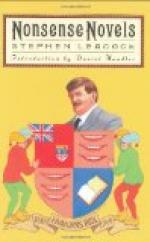The apple-pie hat which she wore, surmounted with black willow plumes, concealed from view a face so face-like in its appearance as to be positively facial.
It was—need we say it—Gertrude the Governess, who was this day to enter upon her duties at Nosham Taws.
At the same time that the dogcart entered the avenue at one end there might have been seen riding down it from the other a tall young man, whose long, aristocratic face proclaimed his birth and who was mounted upon a horse with a face even longer than his own.
And who is this tall young man who draws nearer to Gertrude with every revolution of the horse? Ah, who, indeed? Ah, who, who? I wonder if any of my readers could guess that this was none other than Lord Ronald.
The two were destined to meet. Nearer and nearer they came. And then still nearer. Then for one brief moment they met. As they passed Gertrude raised her head and directed towards the young nobleman two eyes so eye-like in their expression as to be absolutely circular, while Lord Ronald directed towards the occupant of the dogcart a gaze so gaze-like that nothing but a gazelle, or a gas-pipe, could have emulated its intensity.
Was this the dawn of love? Wait and see. Do not spoil the story.
Let us speak of Gertrude. Gertrude DeMongmorenci McFiggin had known neither father nor mother. They had both died years before she was born. Of her mother she knew nothing, save that she was French, was extremely beautiful, and that all her ancestors and even her business acquaintances had perished in the Revolution.
Yet Gertrude cherished the memory of her parents. On her breast the girl wore a locket in which was enshrined a miniature of her mother, while down her neck inside at the back hung a daguerreotype of her father. She carried a portrait of her grandmother up her sleeve and had pictures of her cousins tucked inside her boot, while beneath her— but enough, quite enough.
Of her father Gertrude knew even less. That he was a high-born English gentleman who had lived as a wanderer in many lands, this was all she knew. His only legacy to Gertrude had been a Russian grammar, a Roumanian phrase-book, a theodolite, and a work on mining engineering.
From her earliest infancy Gertrude had been brought up by her aunt. Her aunt had carefully instructed her in Christian principles. She had also taught her Mohammedanism to make sure.
When Gertrude was seventeen her aunt had died of hydrophobia.
The circumstances were mysterious. There had called upon her that day a strange bearded man in the costume of the Russians. After he had left, Gertrude had found her aunt in a syncope from which she passed into an apostrophe and never recovered.
To avoid scandal it was called hydrophobia. Gertrude was thus thrown upon the world. What to do? That was the problem that confronted her.




